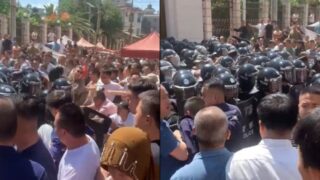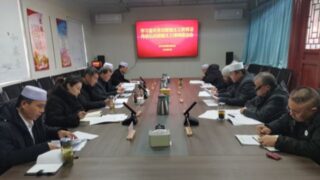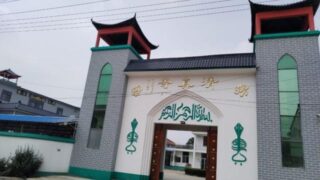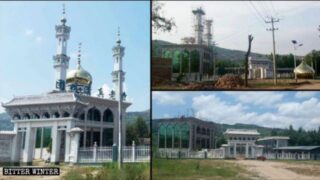Hailed by the authorities for years as the “good Muslims” or “model minority,” China’s Hui citizens are experiencing the crackdown on their culture and traditions as part of the anti-Islam campaign in northwestern provinces and regions.
The Ningxia Hui Autonomous Region, known as the “homeland of the Huis,” has inherited and carried forward the traditions and culture of its people, and showcased the Hui people’s Muslim faith through a unique architectural style. Since the Chinese authorities launched the so-called “de-Arabization” initiative earlier this year, Arabic-style buildings in the Ningxia Region have suffered unprecedented modifications when any Islam-related symbol is being removed from them.


A residential area in Yongning county of Yinchuan city, is one such example. According local residents, authorities dismantled Arabic-style decorations on the exterior walls of the buildings in this area. A construction worker told Bitter Winter that the United Front Work Department gave the orders to remove such decorations in the beginning of spring this year. The construction company where he works has been carrying out the dismantling work in this particular residential area for one month now. The workers have been ordered to paint over writings in Arabic on buildings as well.
Video: Workers remove Arabic-style decorations from walls.
In the village of Najiahu in the same county, the Arabic characters for “Zhonghua Huizu First Street” and Islam-related scripture on Hui-style buildings have all been painted over with blue paint.


The authorities have renamed Yinchuan city’s Sino-Arabic Cultural Exhibition Center to Silk Road Culture and Travel International Resort, and the Arabic logo has been changed to pinyin – the Chinese, written using the Latin alphabet.


We received reports from the neighboring province of Gansu about the suppression of Muslim customs and traditions in teaching institutions.
In early August, the principal of a kindergarten in Lanzhou city was summoned by the local government for organizing an Arabic language course for children. According to the principal, the officials told her that the national school policy does not include the Arabic language courses, and that teaching Arabic violates the Chinese Communist Party (CCP)’s educational policy; thus, she is prohibited from teaching Arabic to children.
On September 6, during a meeting of teachers at a secondary school in Linxia city, the principal prohibited the married female teachers wearing headscarves that covered their ears; they were told to wear hats instead. Male teachers were instructed not to wear traditional Muslim white caps and were prohibited from wearing ethnic Hui clothing or accessories in school. Arabic lettering was ordered to be removed from the cutlery in the school’s canteen. The CCP members were warned against having any religious beliefs, and all teachers and staff were given to fill out a Self-Inspection Form for Religion-Related Issues questionnaire to reveal more about their religious affiliation.
Reported by Li Zaili










